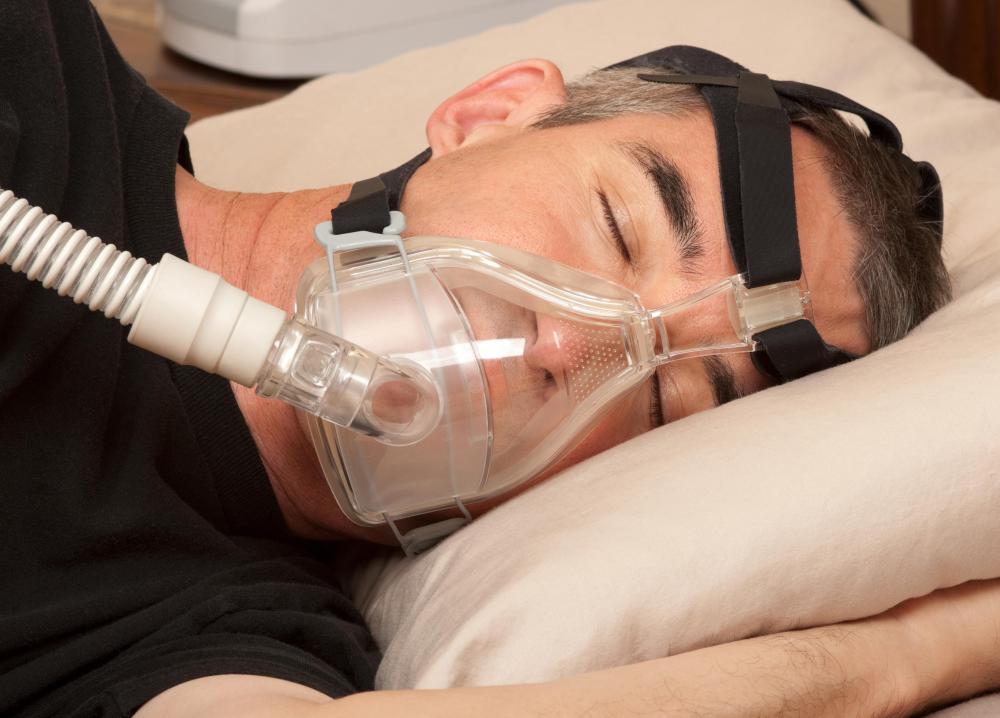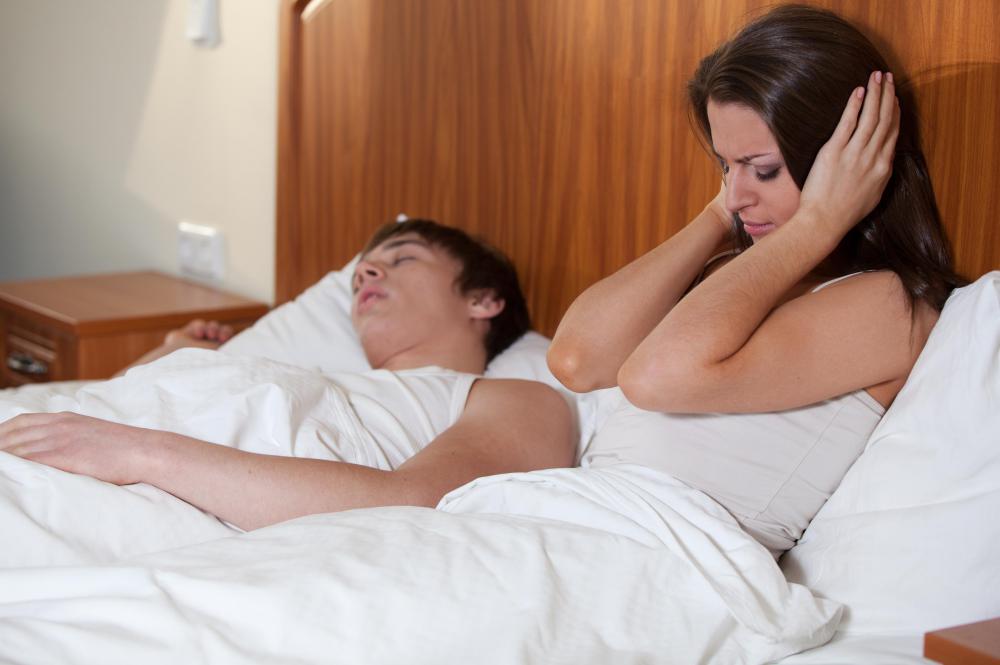At WiseGEEK, we're committed to delivering accurate, trustworthy information. Our expert-authored content is rigorously fact-checked and sourced from credible authorities. Discover how we uphold the highest standards in providing you with reliable knowledge.
What is a CPAP System?
A continuous positive airway pressure (CPAP) system is a medical device which is designed to keep a patient's airway open while providing respiratory ventilation so that the patient can breathe. These systems were originally used in the treatment of obstructive sleep apnea (OSA), but they are also used in some medical settings such as intensive care units. In contrast with respiratory ventilators which require intubation, a CPAP system is very easy to use, and it usually has less side effects.
With a CPAP system, a patient wears either a face mask or a nasal pillow, and a CPAP generator connects with a tube. The generator creates a steady flow of pressurized air which holds the patient's airway open, sort of like how the pressured air inside a balloon keeps the balloon inflated. If a patient cannot breathe on his or her own, the CPAP system provides a steady supply of air, while patients who suffer airway closures when they sleep will not have experience airway obstructions while using a CPAP system.

For people with apnea, a CPAP device can make it easier to sleep through the night. Patients with OSA wake up repeatedly as a result of the airway closures they experience in their sleep, and they can develop daytime fatigue and a number of other problems if the apnea is not treated. With CPAP, patients can sleep safely, and symptoms such as snoring and insomnia will be resolved. It can take some time to get used to sleeping with the machine.

CPAP systems are not usually available over the counter, because the air pressure needs to be prescribed by a doctor. For apnea patients, the prescription is usually written by a sleep doctor who determines the level of pressure necessary to keep the airway open, while patients in the hospital will have their CPAP systems adjusted by doctors and nurses if needed. Getting the right pressure is critical, as pressure which is too high can damage the lungs.

There are a number of variations on the CPAP system. An auto-CPAP will modulate the pressure in response to the patient's respirations, and bi-level CPAP machines reduce the pressure when patients breathe out. Since patients sometimes complain of discomfort while wearing a CPAP machine, these more advanced devices can increase compliance with a CPAP prescription by making it easier for the patient to wear the device. Some CPAP machines can also humidify the air and perform other functions, including logging data about a patient's respiratory rate.
AS FEATURED ON:
AS FEATURED ON:















Discussion Comments
My Dad had a sleep study done because he has always been tired all the time, no matter how much sleep he gets. He also, over the past ten years, has woken up super early and can not go back to sleep. The doctors found out he has delayed sleep apnea and delayed sleep insomnia.
At first the doctors wanted him to try to go to sleep later, to see if that would help him sleep longer, but that did not help at all. He would just end up more tired because he lost an hour or two of sleep from trying what they had in mind.
Since that did not work, they prescribed him a CPAP system. Unfortunately for him, and us, this system/machine has not helped him thus far. If this does not help him get more than five hours of sleep every night, they may try him on some sleeping pills. It seems like the CPAP system works for most people, but sadly, it does not work for my Dad.
I hope he gets the sleep he needs as soon as possible. I hope my Dad will finally feel refreshed and rejuvenated swiftly.
@miriam98 - I can't afford the hospital treatment, but I am looking into getting something for my condition.
I believe that I have sleep apnea. I often wake up at night unable to breathe, gasping for breath. I find that if I massage my diapragm or lungs it gets the air flowing again, but still it's not good, and it does prevent me from getting a good night's sleep.
I may look into a CPAP system. I've tried other tips like sleeping on my side or raising my head on a pillow, but it hasn't helped much.
I have a friend at work who suffered with sleep apnea for quite some time. Finally he agreed to go in for medical treatment at the hospital. He was monitored while he slept. They hooked up this CPAP system to him, to record breathing patterns and ensure that he got sufficient oxygen too.
When the results were in he was quite surprised. He was told that there were several times during the evening where he stopped breathing (at least fully) for several minutes. That came as quite a shock. He eventually got a nasal CPAP system and breathing machine to enable him to sleep better at night.
It made a big difference in his sleeping patterns. When he awoke he felt refreshed and was much more alert during the day.
@dfoster85 - Speaking as a husband, I think it might work if you stop *threatening* to move to another room and actually do it! That might be the trigger.
Otherwise, it's really hard to help someone who won't help themselves, and nagging will be ineffective. You might discuss it with him one more time. Find some testimonials from people who've gotten them; it can be really life changing. Don't lecture, exactly, but know about both the lifestyle benefits and the long-term health benefits. Then tell him that you love him and you want him to be more present (i.e., more awake) when you are together. And that you won't bring it up again, but you'll be there for him when he's ready.
It's a commitment; you have to have a sleep study done first, which requires spending a night in a special lab. And the CPAP headgear does take getting used to. But my father found it to be incredibly rejuvenating. He drinks too much and takes medicine for bipolar disease and ADHD, and we all thought he was drunk and overmedicated. He would sleep twelve hours at night and still nod off at the dinner table. But once he got the CPAP, he had his life back. He sleeps 7-8 hours and wakes up refreshed. He has more energy for the grandkids, who finally have a chance to get to know him.
Any advice for trying to get my husband, who I think has serious sleep apnea, into a CPAP? He thinks it would be uncomfortable. But his snoring is so bad that I have already been threatening to move into another room, and so far he is unmoved.
He just seems so tired during the day, even though he sleeps nine hours at night. I think that if he were getting a better night sleep, he would be more rested.
Post your comments